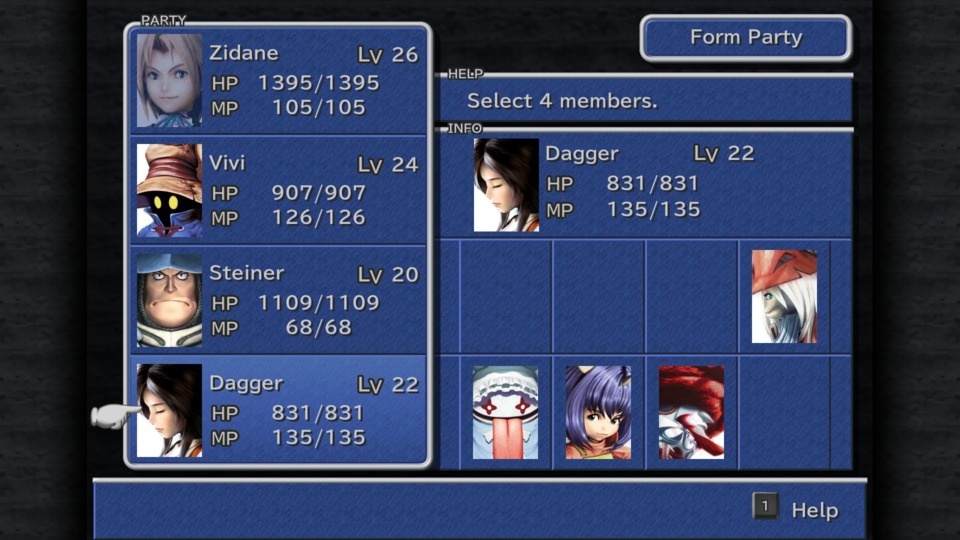Fighting Final Fantasy IX Part 75-88: This Game Just Wasted Five Hours Of My Life On Faffing About!
By ZombiePie 41 Comments
Part 75: We Are In Alexandria… Again... To Accomplish JACK SHIT
Righty-o then, last time we met our motley crew was meditating on some heavy shit. Kuja used a giant eyeball in the sky to ensnare Bahamut, and Queen Brahne was effectively offed in a matter of seconds. Final Fantasy IX’s story popped off in the concluding moments of disc two, and it was a marvel to watch over. Be that as it may, Final Fantasy IX has a noted tradition of failing to complement its action set pieces with appropriate supporting sequences. And guess what dear readers? THAT’S EXACTLY WHAT HAPPENS IN THE FIRST FOUR HOURS OF DISC THREE!
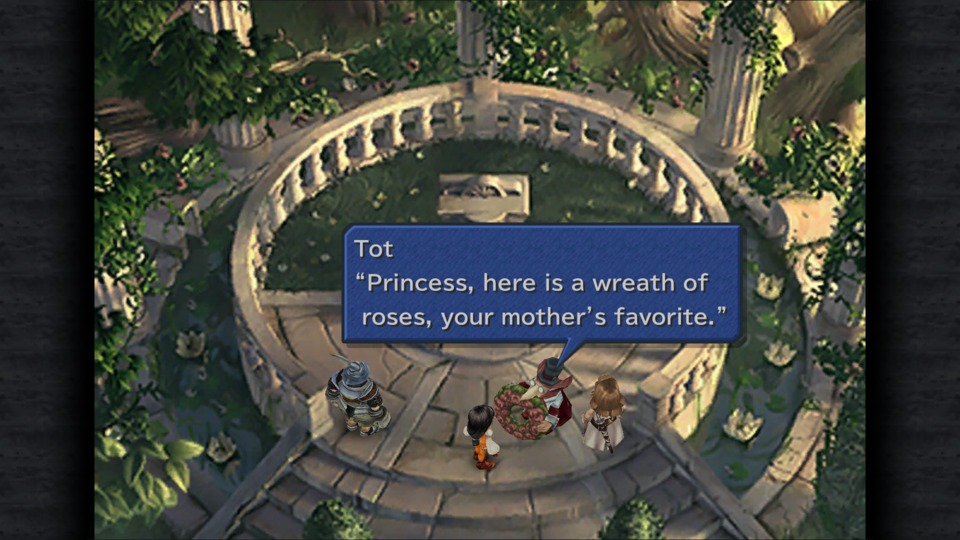
To be honest, I at least see and understand the purpose of Garnet’s coronation. Garnet is effectively torn between two worlds and is left to lament her loss of freedom and independence. As the heir to the Alexandrian throne, Garnet will be forced to assume responsibilities she previously has shirked away from. Here’s where I begin to have a problem with the game’s honest intentions. While you clearly observe the emotions Garnet is meant to telegraph to the audience, the game does a horrible job of spelling out why this is the case. Despite a few flirtations here and there, Garnet still hasn’t explicitly stated her feelings pertaining to Zidane. Nor has she indicated any affections towards the other members of the cast. So what is Garnet torn between? Does she miss her ability to vicariously move from one place to the next? Is she intimidated by her stately responsibilities? Is she embarrassed to confront her feelings regarding Zidane? Is she depressed by the death of her adopted mother? Why does she spend the first three hours of the game moping in the background?
This in and of itself is not a critical malady. As mentioned previously, the game's intent is so comically transparent to the audience, you can fill in many of these narrative gaps yourself. That aside, it feels like a missed chance to elevate Garnet as a character. Here the game practically wasted an opportunity to convey Garnet as confronting, and successfully addressing, a dilemma by herself. Doing so would have established her as the rightful heir to the throne, as well as a strong independent force for action. I mention this on account of the game laying the foundation of this being Garnet’s character arc since her introduction. Lacking this proactive character development simply highlights how inconsistent Garnet’s characterization is. She dons a fanciful dress for the sake of it, but without being afforded the opportunity to earn it. But hey, at least the visual spectacle is interesting to look at.
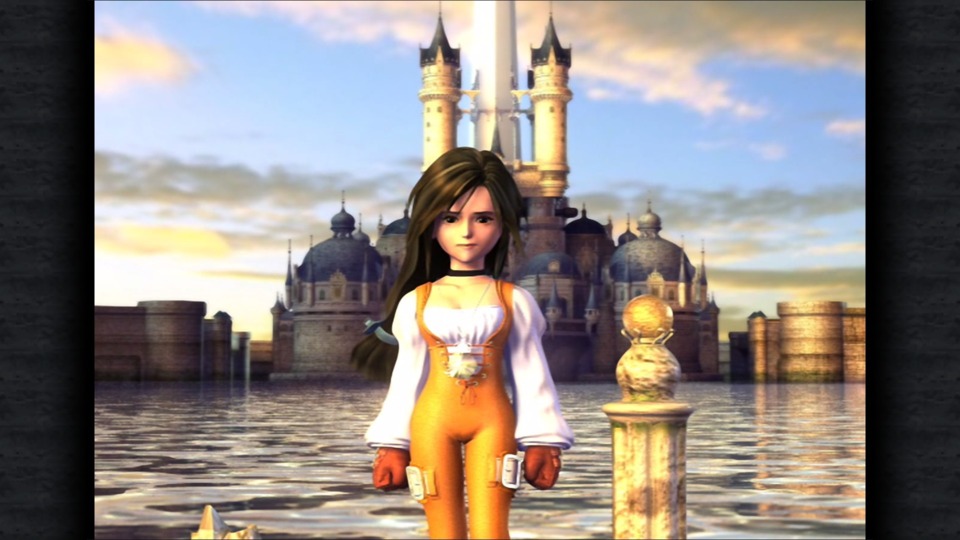
Part 76: Then There’s The Rest Of The Cast
Let’s address my major issue with the first four to five hours of disc three. The problem I have is everything you do is utterly inconsequential to the progression of the story. Kuja essentially has the ability to level entire nations, and practically none of the story’s major players acts upon this. Instead, everyone appears gripped by the news of Garnet being crowned the Queen of Alexandria. I’m sorry, but has everyone forgotten the fact Kuja possesses Bahamut? Does anyone remember Kuja effectively destroying the entire Alexandrian navy in one fell swoop? Doesn’t anyone notice this? I feel like I’m taking crazy pills!
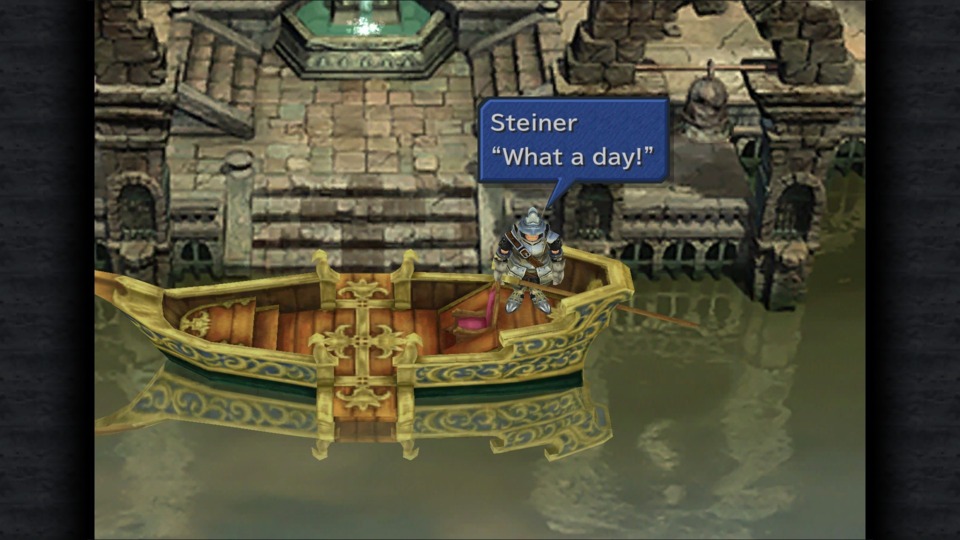
Rather than depicting our cast members as being spirited members in an adventure, the game instead conveys them as beholden to their base emotions. Zidane is seen wallowing away due to his carnal lust for Garnet, and Amarant is shown obsessing over his desire to “get even” with Zidane. These are just a few examples of the game entirely regressing its previous characterization of members of our party. For example, Steiner returns to his dumb-ass goofy nature after showcasing a more humanistic side prior to this. Worse yet, Vivi is back to tripping and falling on his ass:
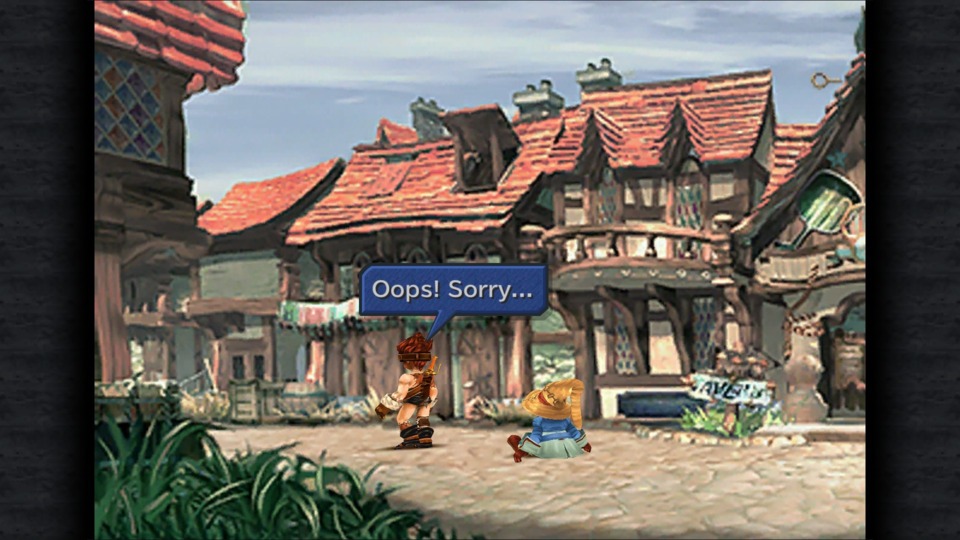
I already know what these characters are capable of providing the story! Just ten minutes ago each of these trope heavy marionettes was defying and inverting my expectations. For the game to revert all this for the sake of adding levity to the story is just “small potatoes.” I also feel there are better ways to inject levity into a story without upending previous accomplishments with the game’s primary cast. All the game needed was your run-of-the-mill party or bar scene! Just have a large portion of the cast relax in one location, and DON’T drag it out for hours upon end. As I always say, there’s more than one way to skin a cat, but this sure as Hell is NOT one of them.
The game eventually transitions to a brief scene between Vivi and Ruby. When I think of characters which needed a transitional scene… I think of Ruby. Can someone honestly tell me what the purpose to this was? Is this the game’s desire to put in shameless fan service? Is this yet another failed attempt at humor? Or is this the game’s honest attempt to re-frame the characters? Either way, everything we accomplish at Alexandria feels entirely pointless. Worse yet, just as I was finally beginning to warm up to the ATE system it goes back to wasting my goddamned time with pointless bullshit! Which leads us to:
Part 77: The ATEs In Alexandria Are BULLSHIT!
Let’s count this down together. While we are in Alexandria there is a sum total of SIX ATE sequences, and they are all COMPLETE WASTES OF MY TIME! The first ATE depicts Eiko entering the royal palace and comically being rejected sustenance from the palace chefs. Why is Eiko allowed to nonchalantly enter the royal palace after the queen was fucking murdered? No honestly, who the fuck is in charge of security at the royal palace of Alexandria? This is the third to fourth time we have witnessed one of our party members casually entering the palace without consequence, and it’s fucking driving me crazy! Either way, the game sets up Eiko for some bullshit love letter scene. OH WE’LL GET TO THAT SOON!
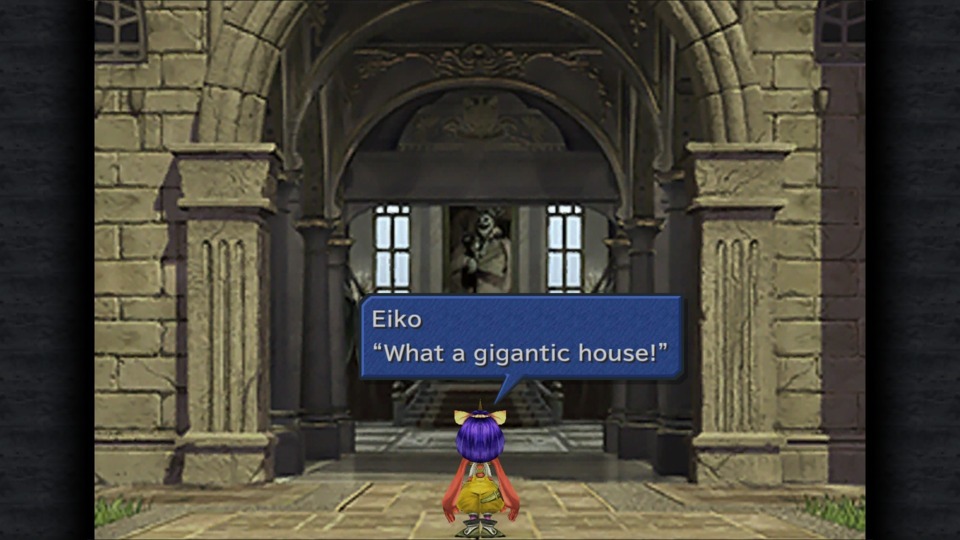
The second ATE depicts a reunion with a trio of bull/animal people. They announce surprise upon seeing each other and go their merry way. I have no idea why I should give a fuck about any of these characters, or how they are important to the story. Let’s just call this scene a failed attempt at adding sentimentality and move on. Oh, but if you thought this was a wonderful use of your goddamned time, then guess what! The next ATE involves Marcus and Blank gossiping about Zidane’s love life!
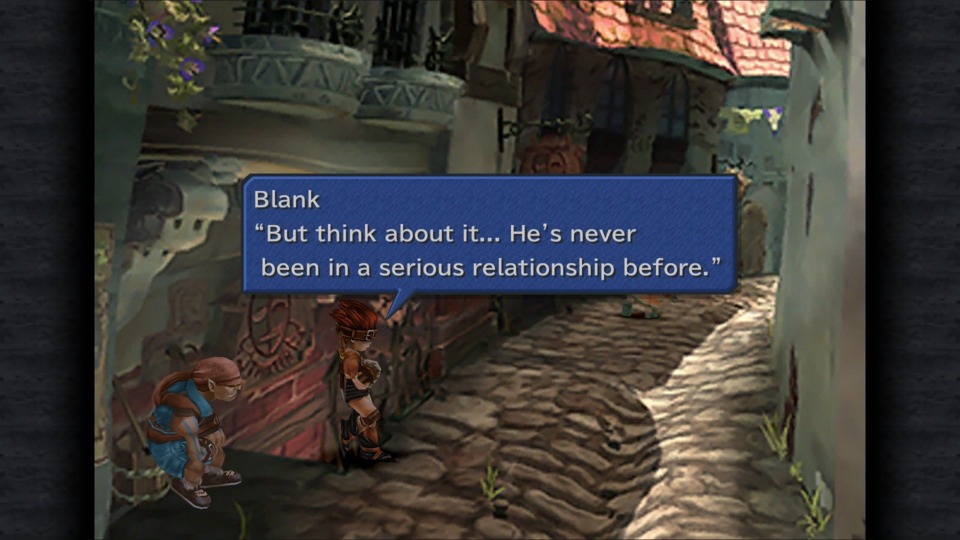
Oh boy, I sure do see the value of the game having this optional cut-scene system. Oh will you look at that, here’s an ATE with a bunch of Moogles you have never seen before, nor understand their purpose in progressing the story:
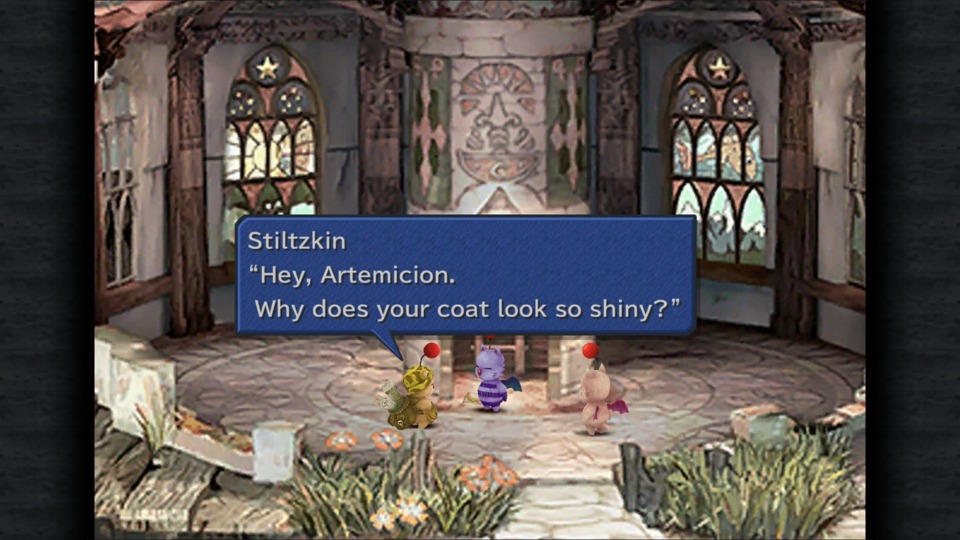
I would be willing to tolerate all this needless bullshit if it actually led to something consequential to the plot. Rather than that, we end up with a series of comical set pieces within Alexandria which do nothing to progress the story. In the end, all the ATEs come across as forced attempts to add humor and levity to the story. Certainly, I can respect the need to provide the cast with “rest time,” especially after a dire and draining moment. However, these ATEs are lacking any narrative backbone, and this results in them feeling disconnected with one another. Our return to Alexandria ends up coming across as less a place for our party to refocus themselves, and more a travelogue found on a tourist brochure. ALSO, DID I MENTION THERE’S AN EVIL SPACE WIZARD WHO WANTS TO SPREAD CHAOS ACROSS THE PLANET?!
Part 78: Saying Goodbye to Garnet, And The Atrocious Love Letter Scene
Somehow through the mist and the madness, Final Fantasy IX finally provides its audience with some narrative sustenance. When Garnet dons her royal garb she initiates her coronation. While this is happening Eiko manages to run into Dr. Tot who takes notice of her horn. We then bear witness to a flashback wherein Dr. Tot reminisces about seeing Garnet for the first time. He reveals Garnet bore a stunning resemblance to Queen Brahne’s, then recently deceased, daughter. Overcome with emotion, the queen and king ordered her horn be removed, and they raised the child as their own.
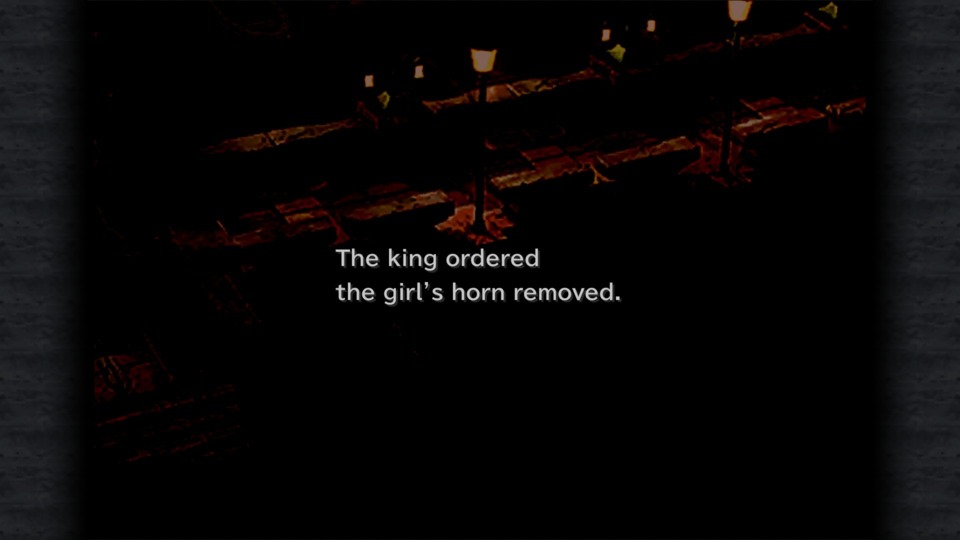
I personally enjoyed this revelation, but question why it is so haphazardly presented. Why does the game suggest Garnet as filling a void in the Queen’s life here, but spent much of the second disc depicting the queen as viewing Garnet as disposable? Just a handful of hours ago we watched the queen declare her intent to execute Garnet! Don’t these two disparate emotional states entirely contradict each other? As it stands I just view this revelation as the game attempting to dig itself out of a hole. It dropped a bombshell when revealing Garnet as a summoner, and this is likely the best the writers could come up with to make that revelation work. It’s certainly clunky storytelling, but you accept it on account of the game’s heart being in the right place.
I say the game’s heart is in the right place for many reasons. For one, the scene wherein Beatrix pledges allegiance to Garnet, despite knowing her true heritage, does the story wonders. Garnet has legitimately earned the trust and confidence of Beatrix over the course of the story through her actions, and the game takes the time to remind the audience of this fact in an emotionally taut scene. Similarly, Zidane struggling to find the courage to say goodbye to Garnet is a real and relatable dilemma. We have all been in Zidane’s position where we needed to say goodbye to someone who was right there in front of us. As we toiled away at what to say we either mustered the courage to do so, or shirked away from having closure. So the story framework for those two elements in Alexandria is fine, unfortunately, everything else is rotten to its core.
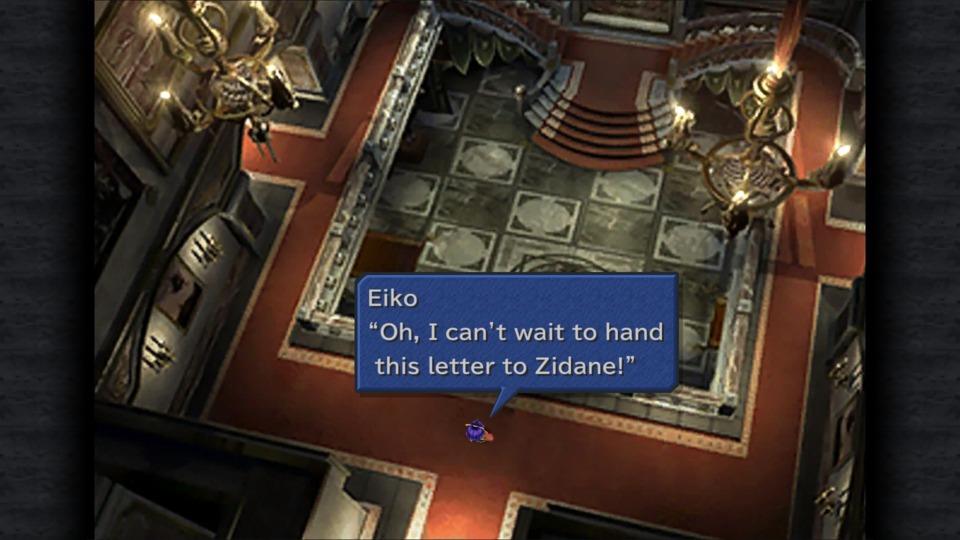
First, why in the world does the game spend as much time with a ham-fisted romance scene between Steiner and Beatrix, as it does with its maturation of Garnet and Zidane? We end up watching the game painfully set up this love letter scene for a whole twenty minutes. In the meantime, you know exactly where this development is headed, and at no point does the execution of the scene invert your expectations. For a game which has thoroughly defied my assumptions time and time again, it is depressing to witness this game fail to rise to the occasion here. It also does not help the belligerent sexual tension between Steiner and Beatrix is so obvious it would make Mulder and Scully blush. Then the scene ends with an “AWKWARD” walk-in thanks to Baku, and now I’m just left with my arms up in the air in disgust.
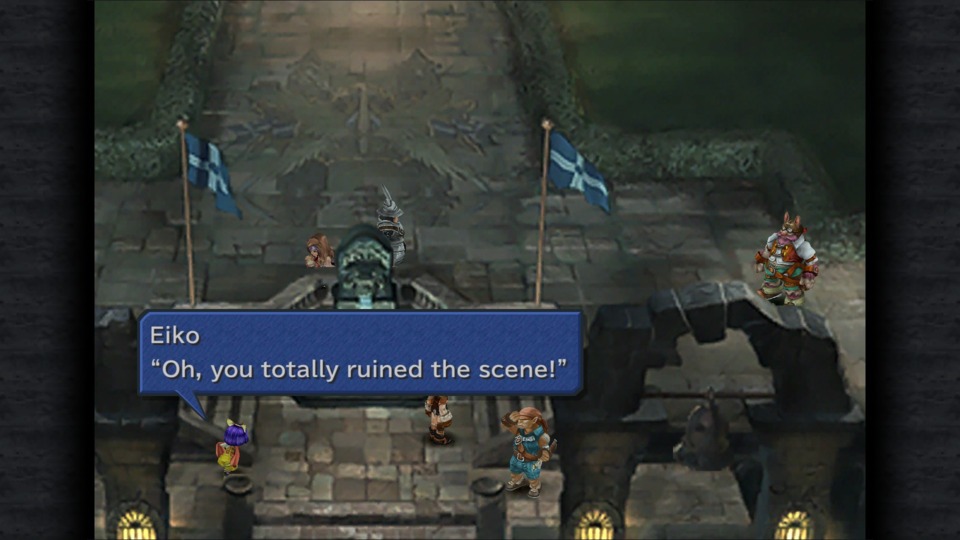
This leads me to one cynical conclusion. 80% of what we witnessed in Alexandria should have been cut from the game. Alexandria should have provided Garnet and Zidane the opportunity to shine and develop. Garnet should have faced her dilemma with grace, and Zidane should have taken the “coward’s way out” as he failed to face his. This would have provided two contrasting moments which imparted a clear message to the player. Taking the moral “high road” subjects the recipient with the least amount of heartache and emotional baggage. What we witness instead is a muddled travelogue which fails to elevate anything. Our cast wallows away on those initial base tropes I thought the story had finally decided to shirk away from. Then again, this is the only manner Final Fantasy IX knows how to depict humor or levity. This entire set piece is a train wreck you know is coming, but you still hold out hope will not happen. Then the train wreck happens and you just resign yourself to self-defeat.
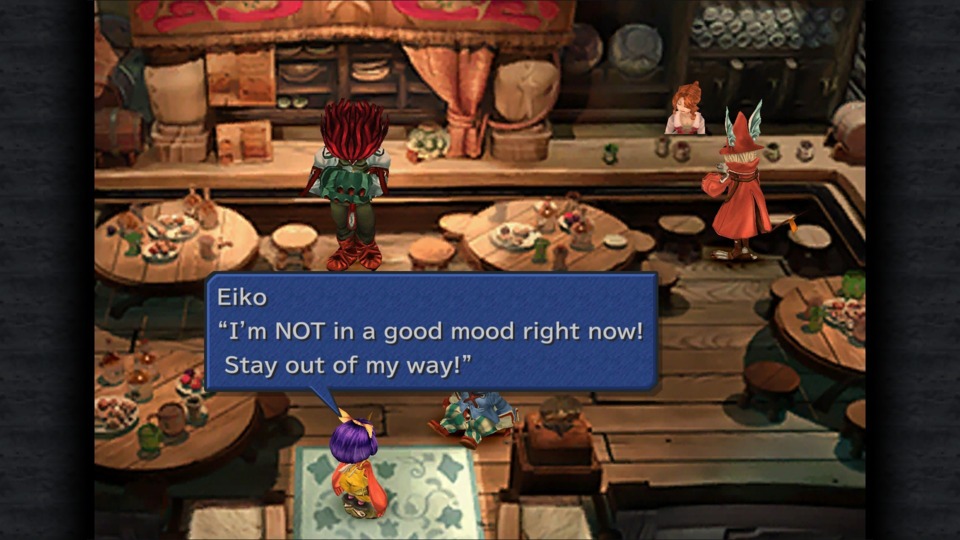
Part 79: We Are In Treno Playing Cards… BECAUSE FUCK EVERYTHING!
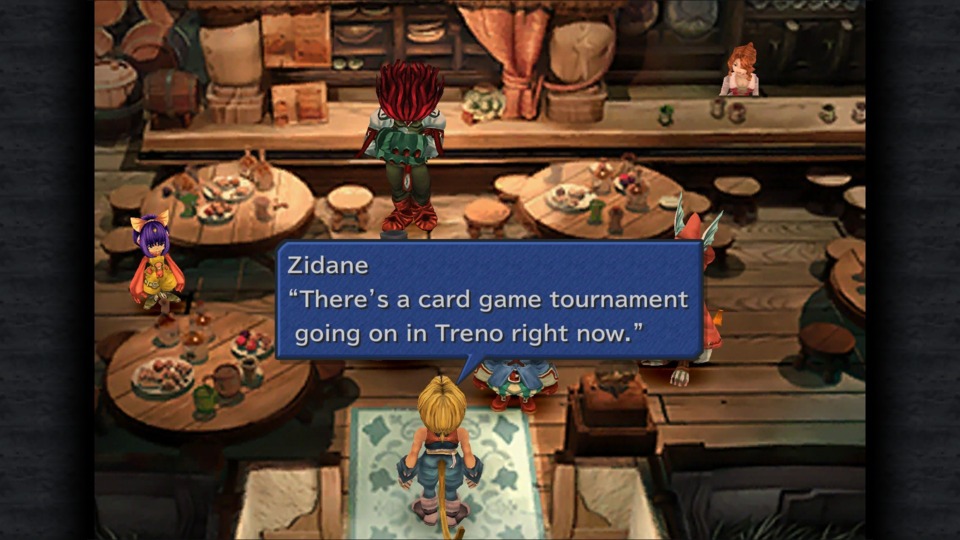
Will someone please tell me why this is happening? I want your honest fucking opinions because why I am playing cards while a magical space wizard is in possession of a city razing dragon is beyond my comprehension. Does the game want to provide the characters with “breathing room?” Well, wasn’t that the whole point of our return to Alexandria? Didn’t we just witness the characters relaxing and recollecting themselves after the conflict at the Iifia Tree? Doesn’t this make our return to Treno, to participate in a card tournament, redundant?
Or how about the notion the game is effectively using its time to build the world in which we are vicariously waltzing through? Whelp, haven’t we already been to Treno before? What more is there to build upon Treno? We already know the city is corrupt and rife with thieves. The game has essentially accomplished all which it could with Treno... yet here we are, playing cards of all things. This sure is a fantastic way to build up Treno as a location of dire importance to the story!
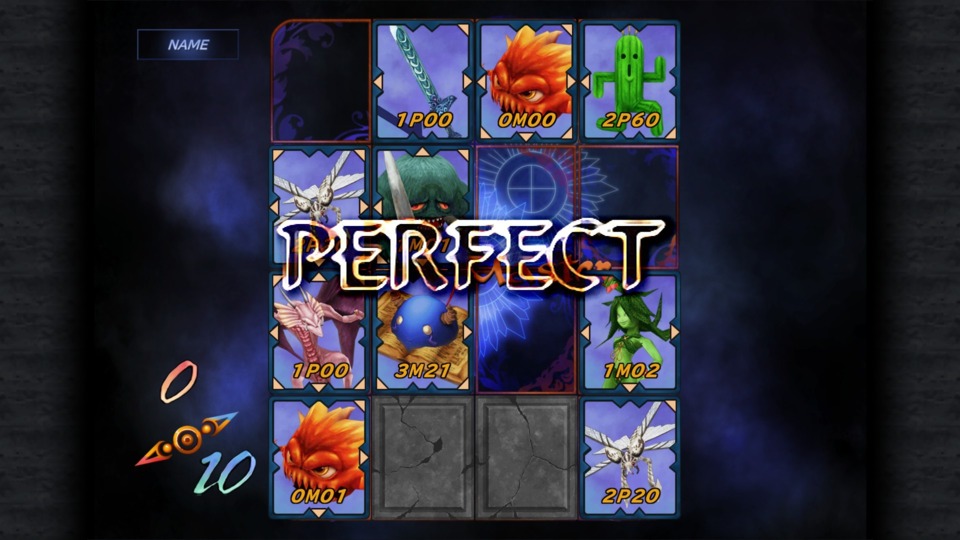
Once again I understand the intent of the game, but yet again I feel the need to decry the presentation of its intent. I get it, Zidane is rebuking his responsibilities in an attempt to fill the emotional void he feels with something superficial. Nonetheless, having me perform a superficial task within the game so I can relate to Zidane’s current emotional state is decidedly SHITTY! There is no fun to be had playing Tetra Master. NONE WHATSOEVER! The various in-game attempts to frame Tetra Master as this fun activity all the characters pine to do, just makes Tetra Master all the more tragic. It is a shitshow from start to finish, and I will not hear any arguments to the contrary!
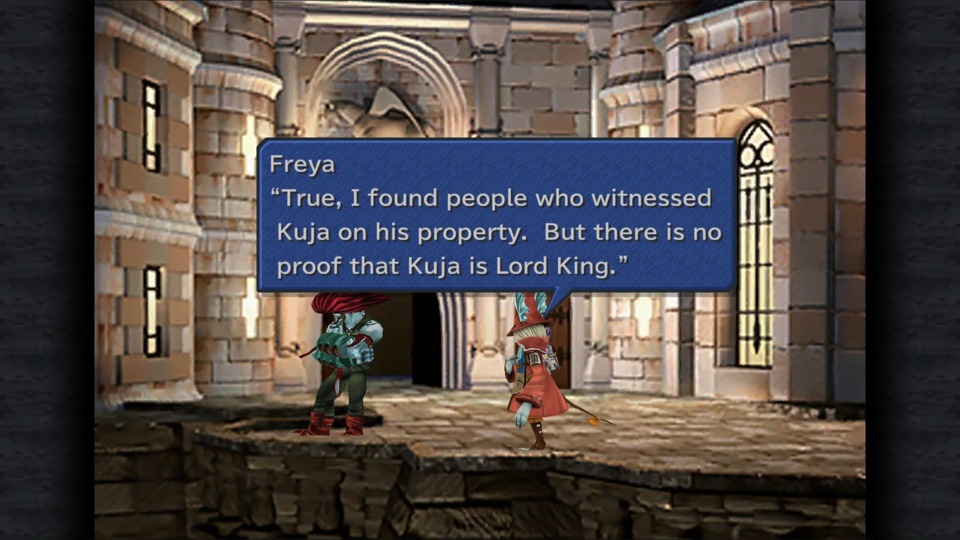
Part 80: Amarant Continues To Be A Waste Of A Character
Now I can hear some of you typing away a harsh rebuke in response to my prior histrionics. “But Chris, there are some interesting moments with the characters in Treno, and you learn more about Amarant’s backstory!” Huh, that’s funny because I recall Amarant’s only character moment here being hidden within an optional ATE. An optional ATE which amounts to no more than two to three minutes. Which I would respond with a good old fashioned “FUCK THAT!”
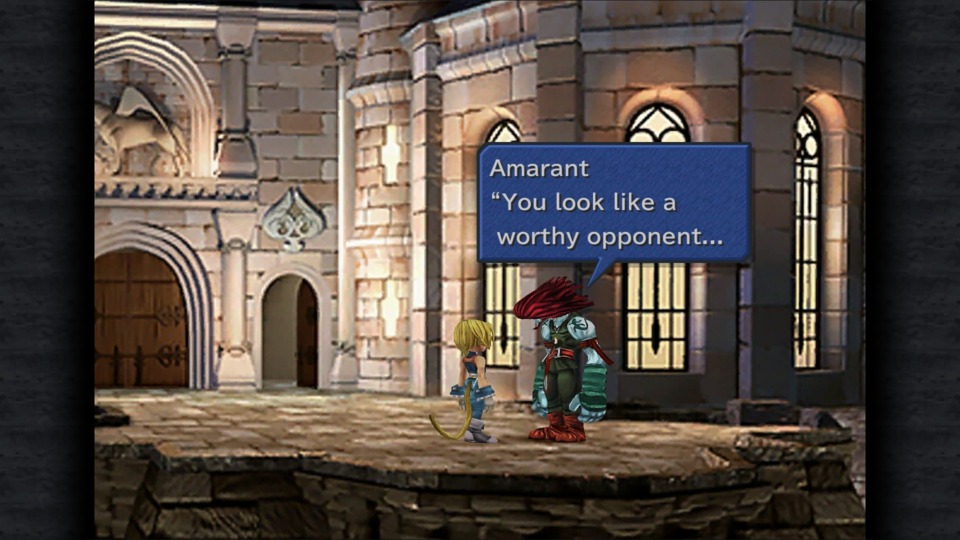
This is just shitty on the writing. Eiko at least had an entire level dedicated to her in Madain Sari. If we are going to return to Treno for the sake of playing cards, why can’t we have more character moments with Amarant? If the game had genuinely progressed one of its characters I would have been willing to tolerate its superficial scaffold for doing so. The game had an opportunity to contextualize Amarant’s ho-hum vagabond ways under a new light, but that doesn’t happen. Instead, I’m left with my hands in the air YET AGAIN!
So what does the game actually provide for the audience regarding Amarant's character arc? After selecting the appropriate ATE, we watch Amarant detail to Freya the reasoning behind his intense rivalry with Zidane. After the game juxtaposes to a flashback, we see Amarant as a guard in Treno. Eventually, Amarant discovers Zidane in process of stealing something from the mansion he was guarding. Zidane, using his quick wits, attempts to convince the guards who were chasing after him the actual culprit is Amarant. For some reason the guards believe Zidane, and Amarant is left behind with his life in Treno in tatters. Not only does this ruin Amarant’s career, but it immediately causes him to become a wanted man in Treno.
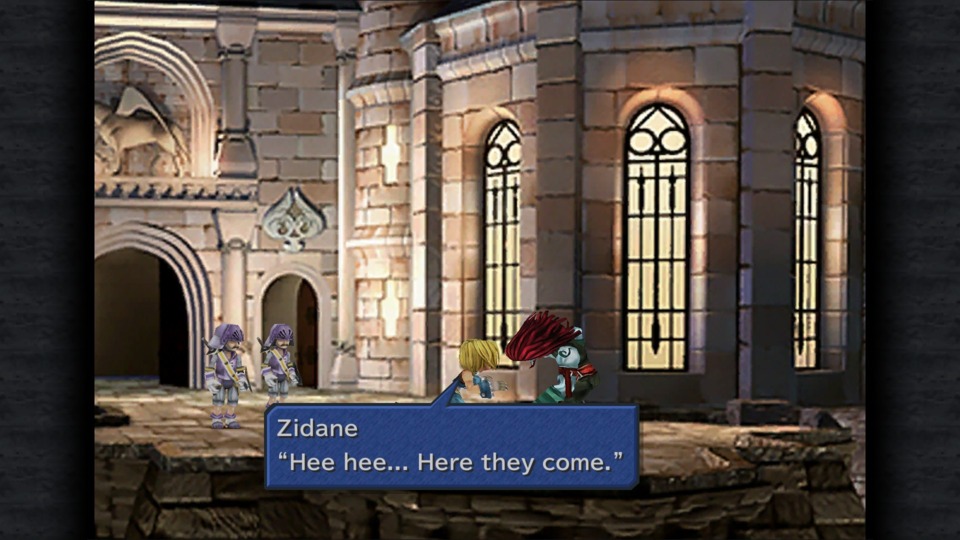
The problem with this is EVERYTHING! Not only is Amarant unfazed about having his career ruined, but he appears nonplussed about Zidane in general. Amarant indicates insufficient understanding regarding Zidane rather than a clear sense of comradery or attraction. This inadvertently puts his place in the party immediately into question. On top of that, what is Amarant’s character arc? Amarant starts off as an introverted vagabond, and he continues to be an introverted vagabond for the entire story. So what was accomplished in including Amarant in the game? Didn’t Amarant join our party to learn how Zidane fights, and discover what his weaknesses are? What happened to that plot development? In the end, I don’t even think the game has an answer to all these questions. Instead, I think it included Amarant in the game as a showcase of the game’s mechanics rather than its narrative.
Also, can we discuss how Zidane essentially uses racism as a tactic to get away with theft? The only reason why the palace guards believe Zidane, rather than Amarant, is when Zidane highlights Amarant’s appearance to the guards. This is decidedly NOT COOL as it is essentially racial profiling played for comedic purposes. Plus, the palace guards were honestly chasing Zidane after physically watching him steal something from the mansion! Why on Earth do they let Zidane off the hook and immediately think Amarant is the culprit? Somehow we are expected to forget all this and continue to view Zidane as our chivalrous protagonist.
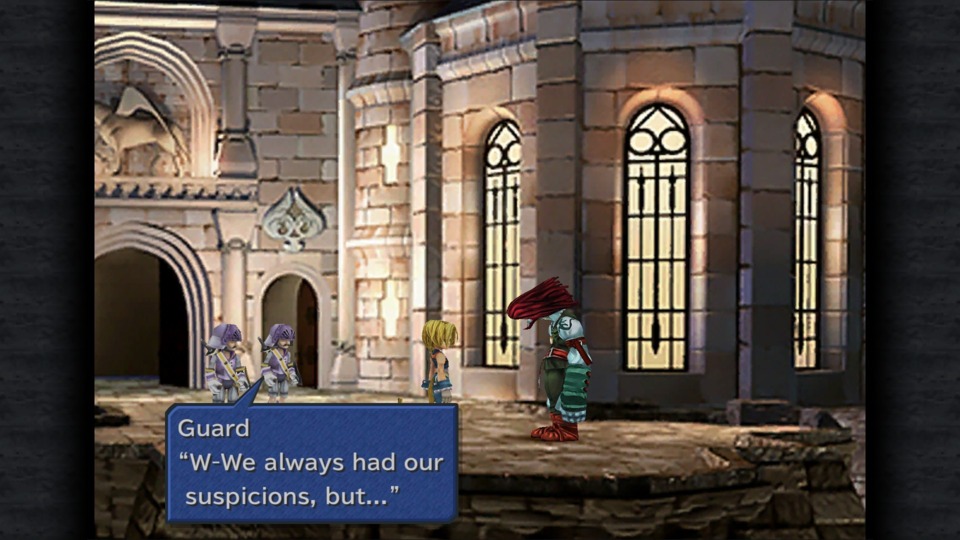
Park 81: OH GOD EVERYTHING IS ON FIRE!
Before we delve into the meat and potatoes of Final Fantasy IX there are a few things I wish to touch upon. At Treno Vivi decides to revisit the cave in which he was raised. There we learn more about his grandfather, as well as Vivi’s upbringing. It’s a quick little scene I enjoyed as it provides Vivi with some time to be introspective. As Vivi marvels over how far he has come since his humble beginnings, you begin to realize how far we have come in the game. It’s a small moment which allows the player to stop and think about their actions and decision making up to this point, and small touches like these go a long way.
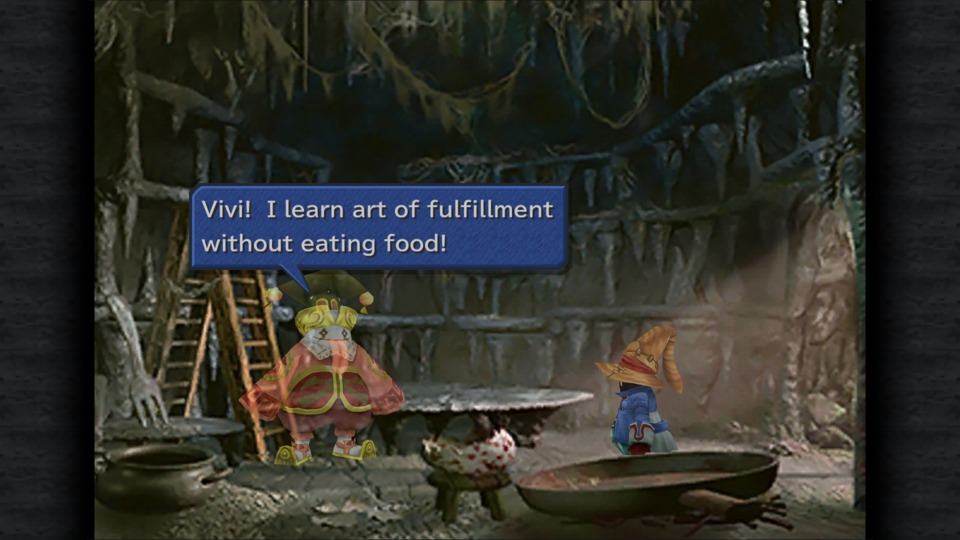
All the same, there are other scenes which I feel are not fully executed upon in Treno. Eiko has another scene with Dr. Tot, and it appears as if we will learn more about the cultural history of the Summoner Tribe, but then we don’t. There’s also an out-of-place subplot where a four-armed man attempts to get one over on Amarant and Eiko but fails on both occasions. I find this “out of place,” seeing how this scene is never mentioned or reinforced throughout the course of disc three. I mention these two scenes as a brief counterpoint to my praise for Vivi’s short aside. If I am going to take the time to highlight small touches which elevate the game, then it would be beholden to me to highlight the small touches which do not.
So back to the “meat and potatoes” of Final Fantasy IX! The card tournament itself is exactly what you would anticipate. It is a series of Tetra Master matches which culminates in a match against a Tetra Master prodigy. For the convenience of the plot, this sage is revealed to be Cid. After defeating Cid we are immediately informed Alexandria is under attack by whom assume to be Kuja. It’s almost as if the threat of Kuja was always looming, and we shouldn’t have wasted our time on Tetra Master in the first place.
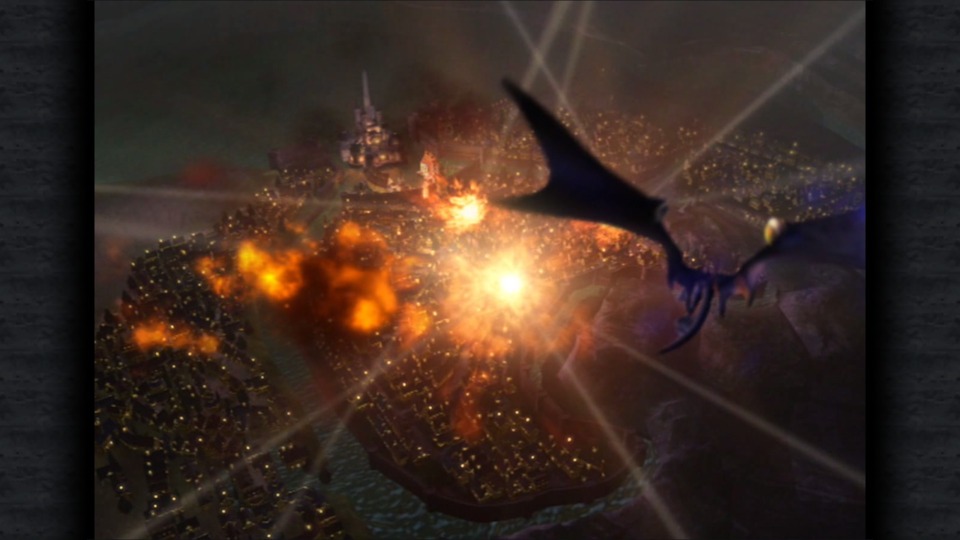
I have harped about the game’s set pieces working better once you “accept the spectacle” for what it is before, and this is yet another example. The only way for this exact series of events to happen is if the plot progress down a pathway of “convenience” rather than logic. There is no logical reason for our troupe of heroes to leave Alexandria to participate in a card tournament. If there was one, then the game spectacularly fails to articulate this reason. However, how can one argue against this when everything is so cinematic and visually stunning?
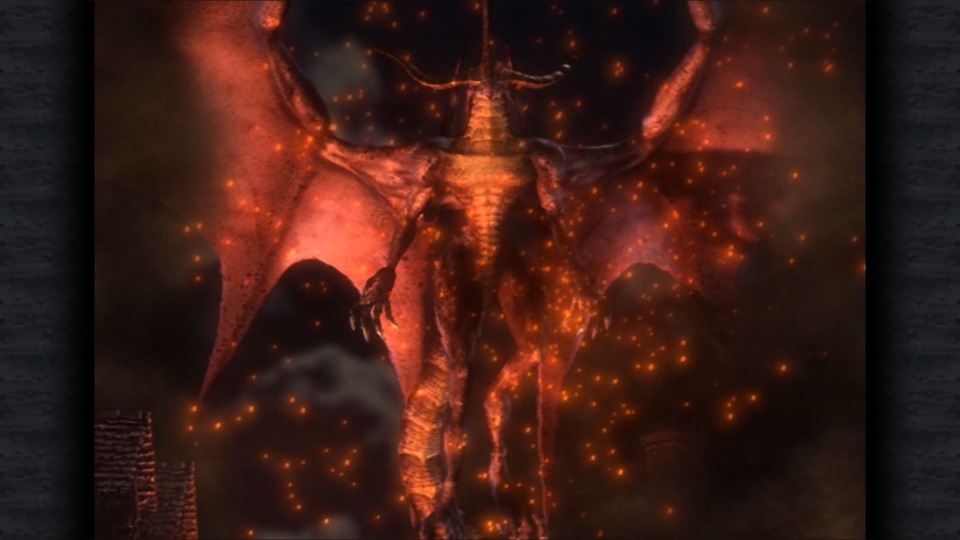
The scope of Kuja’s destruction is simply awe-inspiring. As Bahamut sets the entire city ablaze we immediately understand each character's roles in preventing further destruction. Steiner and Beatrix seek to rescue trapped civilians from monsters; Garnet assumes a leadership role in guiding the city's citizenry; and Zidane seeks to protect the only person he knows he can protect, Garnet. All this is telegraphed to the audience without ham-fisted expository text, or narrative shattering comical set pieces. There’s a sense of stakes to every scene we do witness, and every character takes their roles seriously.
I mentioned earlier how the game provides Garnet with the opportunity to function as a leader rather than as a naive passive observer. As Kuja’s wrath is inflicted upon Alexandria, Garnet has the ability to provide a troupe of knights with orders on how to protect the city. The mechanical execution of this scene is my only qualm with it. The proper roles for each knight are entirely guesswork, and at no point are you provided with any supporting information as to which role fits which knight. All the same, I have to praise the game for providing Garnet the opportunity to assume some royal responsibilities after spending what felt like a lifetime on her coronation.
Part 82: Wait What’s Happening?
Initially the action set pieces in Alexandria work, but then everything starts to slowly fall apart. Things start on a wonderful note with Steiner and Beatrix. The two endeavor to rescue as many citizens from the destructive monsters which Kuja somehow unleashed upon Alexandria. Following a half-dozen or so battles, the couple quickly finds themselves cornered. Just as Steiner begins to muster the courage to admit his affection towards Beatrix they are thrust into a battle to the death. I honestly think this is the best scene the game has had with Steiner yet.
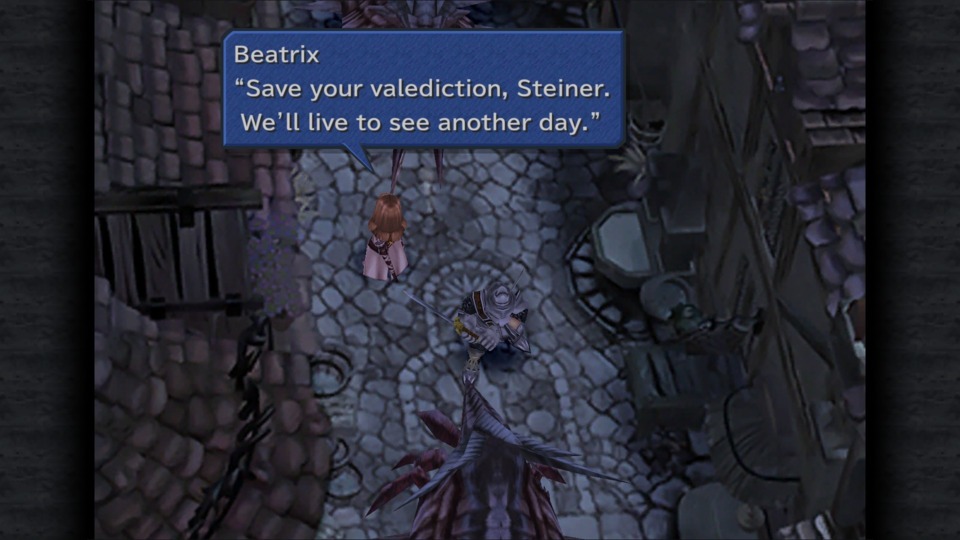
Then things get weird. And not a “good weird,” but instead, a general “Final Fantasy being Final Fantasy” weird. A giant castle appears in Alexandria, and Garnet automatically assumes this castle is completely safe to climb up. Then again the castle is glowing, and we all know you can trust things which glow. Garnet eventually reaches a flat surface on the magical castle where she then exclaims her need to be a strong independent woman who don't need no man telling her what to do.
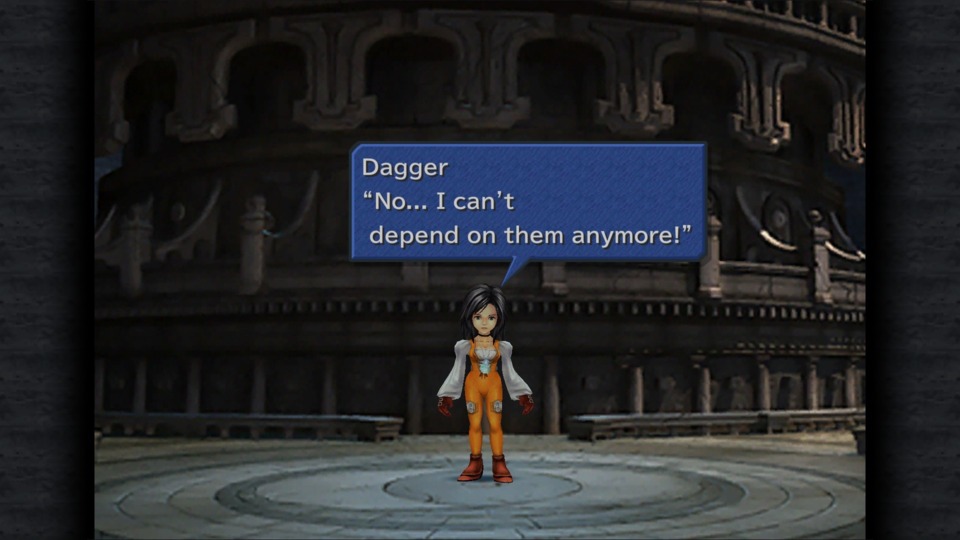
The game then transitions to our main party on Cid’s airship. There Zidane prompts Eiko of all people for answers on their current situation. YOU ARE GOING TO ASK EIKO FOR ANSWERS? SHE IS FUCKING SIX YEARS OLD! Following a line of questioning from Zidane, Eiko decides to jump from the ship to reach the magical castle. The magical castle stops Eiko from being smashed to bits and allows her to reconnect with Garnet. Once the two have a moment together we discover Garnet’s gems are causing this to happen, and Alexandria has some sort of eidolon which protects it named “Alexander.” Then they start praying to someone or something… I honestly don’t know what was happening in the story at this point.
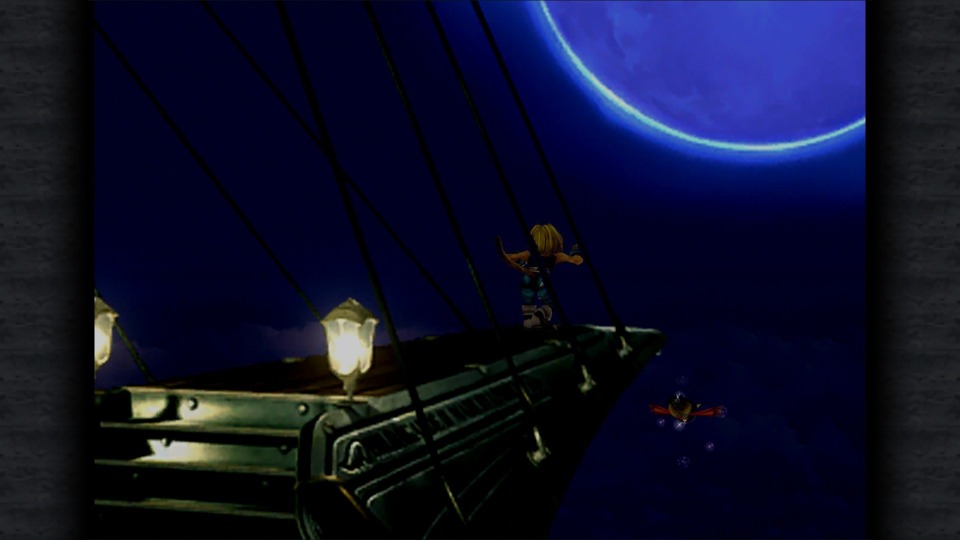
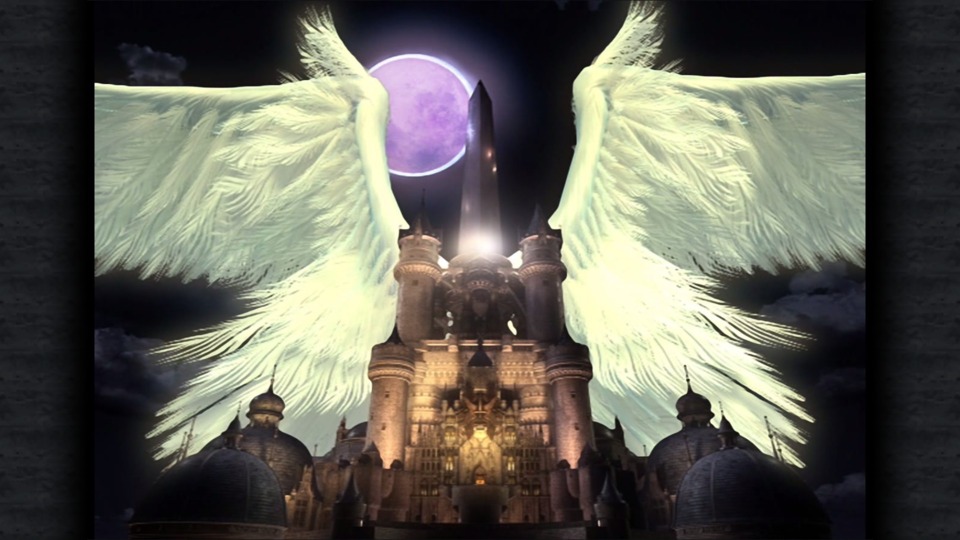
Final Fantasy IX throws a myriad of terms and proper nouns at your direction without ever clearly articulating what is what. It wasn’t until after the magical castle sprouted angel wings I finally could piece together it was an eidolon. The scene is certainly visually stunning, but it is far from being narratively cohesive. The game basically tosses a bunch of bullshit at the scene and hopes it makes some semblance of sense to the audience. Then to make things worse, a random grandpa on a spaceship pops out of nowhere and does something to stop Kuja’s airship, The Invincible, from functioning properly.
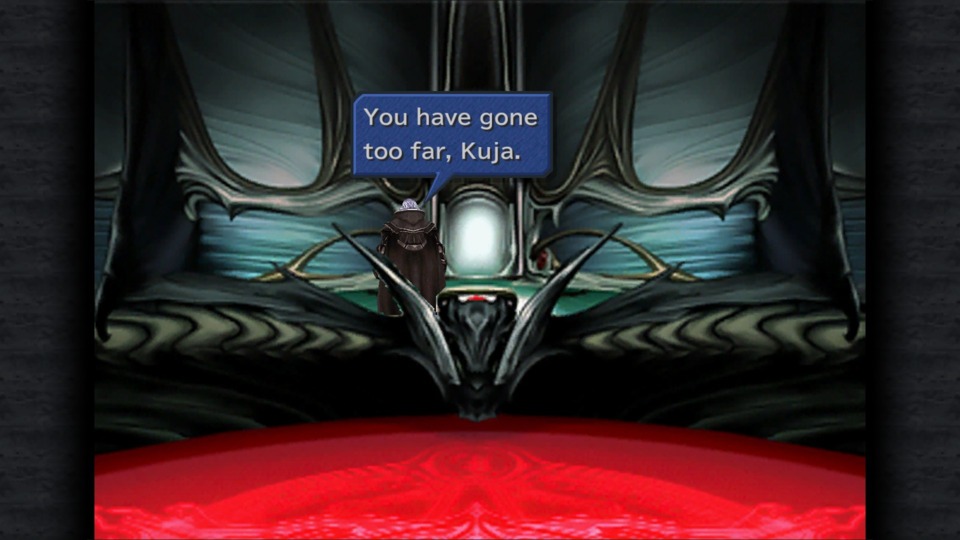
The game crams what feels like a dozen plot points into one scene. Consequently, no one plot point can shine during this otherwise spectacular moment. This seriously weighs down the visual gravitas of what we witness in Alexandria. So all the while Eiko and Garnet are praying to an unnamed and unknown god; there’s a holy castle shooting laser beams at a dragon; Steiner and Beatrix formalize their relationship; a robot grandpa has some sort of control over Kuja; finally Kuja is powerless to a robot grandpa. What am I to make of all this? Once again I don’t think there’s an answer to this question, and that’s what prevents me from being especially excited at what I witnessed here. All the same, at least everything was pleasant to look at.
Part 83: When In Doubt Just Throw More Explosion On The Screen
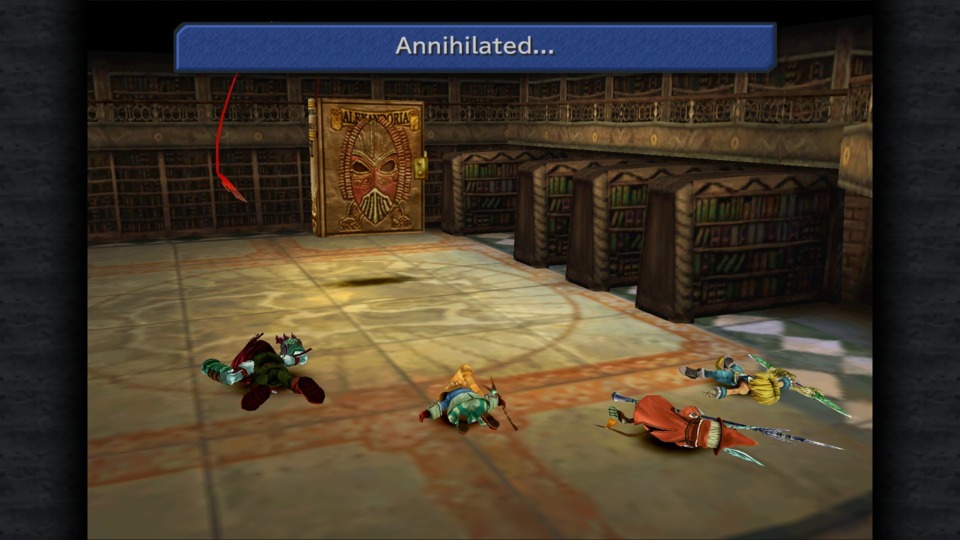
Eventually, our party reaches the base of Alexander. There Zidane offers to locate Garnet and Eiko by himself. Justifying his actions by correctly postulating the dangers of summiting Alexander, as well as his personal need to locate Garnet, our motley crew consents. Once Zidane relocates Garnet and Eiko bright beams of lightning start to destroy Alexander. All I can say is your guess is as good as mine. Are the bolts of lightning coming from the robot grandpa? Is Alexander dying? What’s even happening anymore?
Ultimately, the characters evacuate from the area surrounding Alexander. They accomplish this just before a massive burst of energy from the eidolon effectively levels Alexandria. Or at least this is what I assume to be the case because after the explosion the game smash cuts to robot grandpa, or I should say, Garland. Any of you still wish to argue against my notion of the destruction of Alexandria being a befuddled mess?
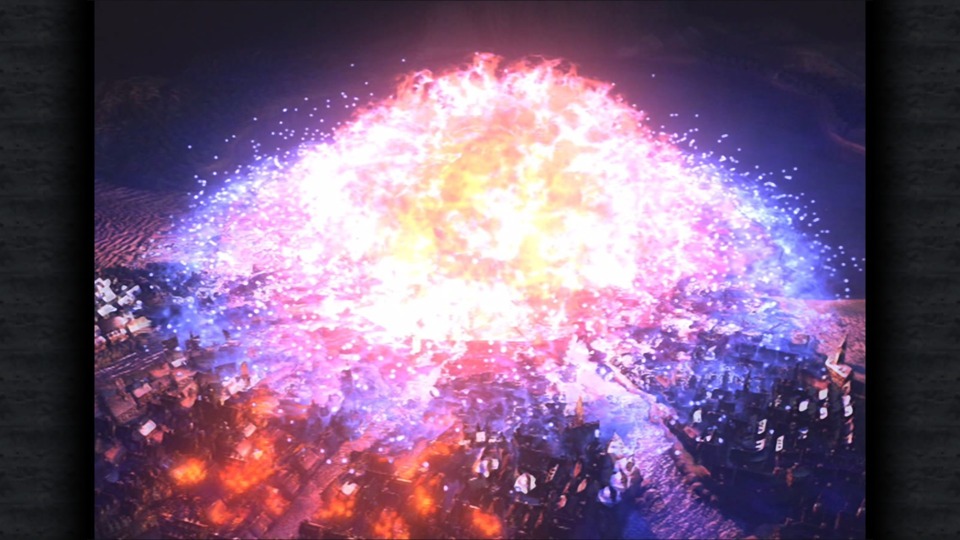
The game then provides Garland with another opportunity to extol his “master plan.” The tragic flaw here is the game has done so little to front load or foreshadow Garland’s existence that his words ultimately fall on deaf ears. It wasn’t until I reviewed his dialogue for the purposes of this blog I fully understood the meaning behind Garland’s words or intent. The game throwing in yet another sudden plot development, in a scene already filled to the brim with them, causes Garland’s scene to become immediately forgotten. This is a shame considering how critical Garland will be to some of Final Fantasy IX’s better moments later.
I would also like to point out how I think Garland acts as a distraction to our current cast of characters, especially Kuja. Just as Kuja was starting to develop nicely as a villain the story decides to needlessly complicate things with another villain whose motivations are unclear to the audience. While many of you who have already played Final Fantasy IX could certainly argue Garland plays a critical role in the game’s ultimate story, this is beside the point. Did the story need Garland, or what he fundamentally adds to the plot? I won't entirely answer this now, but I just want all of you to think about this question for a bit.
Part 84: Garnet Gets Hit By The “Anna Karenina Disease”
Somehow Cid is capable of transporting everyone to Lindblum where they can rest and recuperate after the cataclysmic events in Alexandria. After awaking from his slumber Zidane immediately attempts to strike a conversation with Garnet. Despite his best efforts, Zidane notices Garnet is not responding to his normal flirtations. Zidane beats a hasty retreat as he makes his way to Cid’s chambers where a meeting is called between our able-bodied cast members. Here our crew fruitlessly attempts to develop a plan on how to deal with Kuja. While Amarant lectures on how Kuja is above their skill level there’s a fun scene where Kuja is seen fuming over his self-perceived failures at Alexandria. I loved this scene and how it re-framed Kuja as being more vulnerable than as he has previously been depicted as:
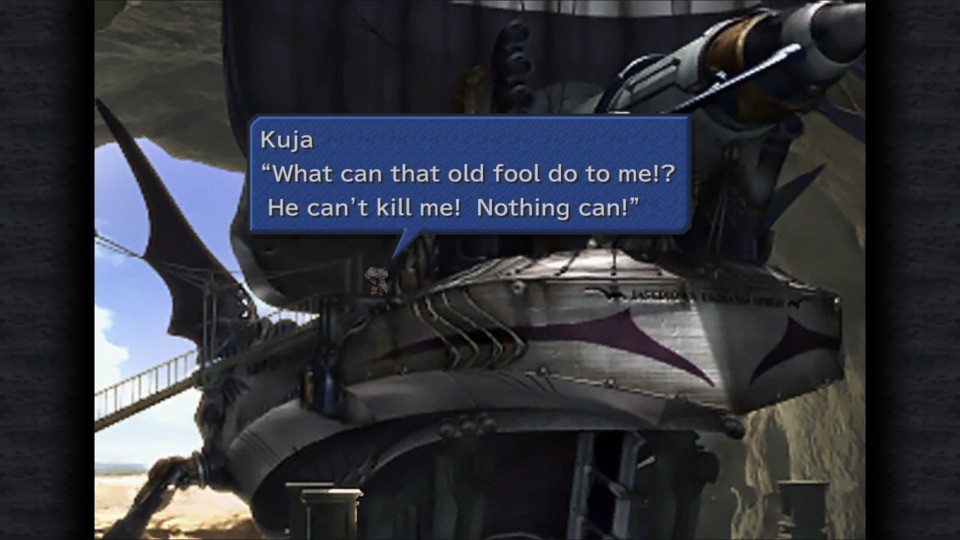
Kuja has already received twice as much characterization as the queen did, and this is a welcomed change of pace. As our cast wallows at their inability to locate Kuja, Eiko brings them the dire news we already were able to piece together ten minutes ago. It appears Garnet has lost her voice and is essentially afflicted with some sort of psychosis. Dr. Tot even “scientifically” postulates Garnet’s condition is a result of her witnessing the devastation of her homeland.
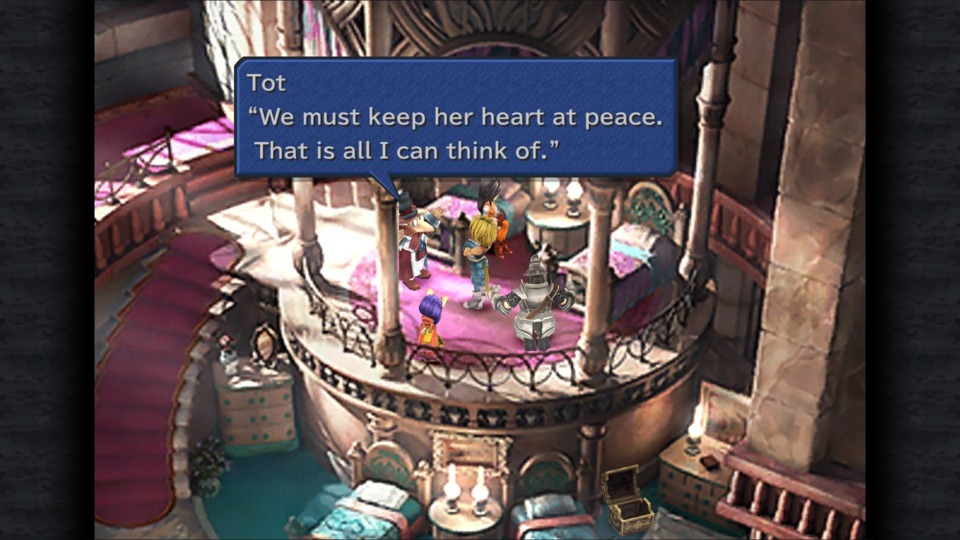
I am between two worlds on this matter. On one hand, I appreciate how the game uses its in-game mechanics to depict a character in turmoil or undergoing a psychosis. The game even takes the time to provide Garnet with silent soliloquies wherein she blames herself for the destruction wrought upon Alexandria. Having only briefly assumed the responsibilities of being Alexandria’s queen, Garnet already views herself as a failure. The failure Garnet feels is a real and raw emotion I think everyone can empathize with. On that note, it is worth mentioning how respectful the rest of the cast is to Garnet whilst in her present condition. Everyone immediately can recognize why Garnet is feeling this turmoil and tries to help her in their own way.
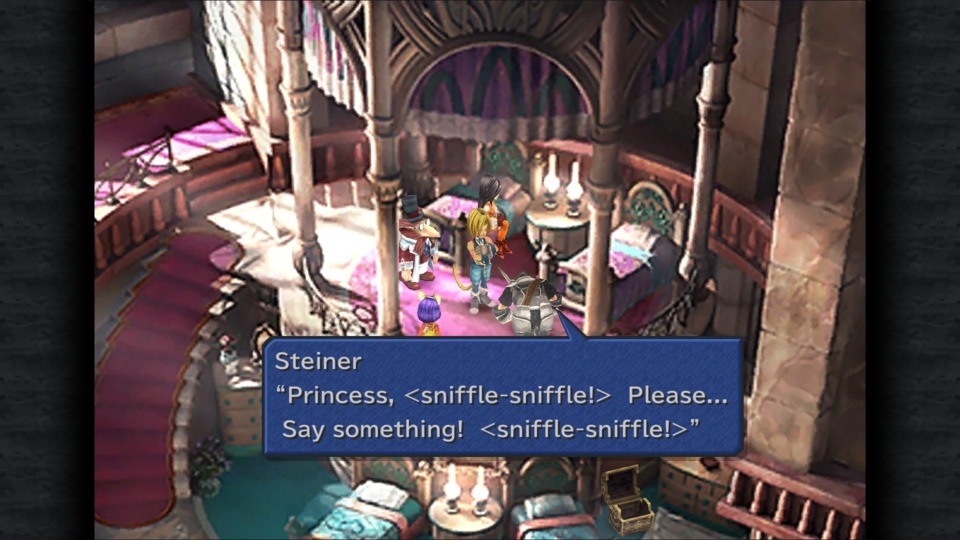
Conversely, I find the crippling of the game’s best healer to be annoying, as well as the game’s depiction of Garnet’s psychosis wanting. While the practical removal of Garnet as an effective party member is a nuisance, it’s the second point I found the most bothersome. For all intents and purposes, Garnet is afflicted with what I like to call the “Anna Karenina Disease.” Here a female character succumbs to a wasting illness, or an undiagnosable "female malady," usually tied to their emotional state. While Final Fantasy IX tries its darnedest to justify Garnet’s present condition, the game still falls prey to one of the oldest tricks in the book. When in doubt, smack your female lead with a wasting disease to establish how evil your villain is. It’s a cheap trick, to say the least, and one I would have hoped Final Fantasy IX would have avoided at all costs, but it is one which proves effective in execution. Conversely, I hate how pedantic this trope is. Oh boy let me guess, Garnet will regain her ability to talk during a moment of self-empowerment and independence. Herein lies my ultimate problem with the “Anna Karenina Disease,” you know EXACTLY where the story is going with the female protagonist afflicted by it. There are ultimately no surprises to be had here. You simply need to sit back and hope the character moments it subjects you to are well done. This necessitates a level a trust with the Final Fantasy franchise I am not comfortable affording it.
Part 85: Oh And The Game Wastes My Time On More Pointless Bullshit!
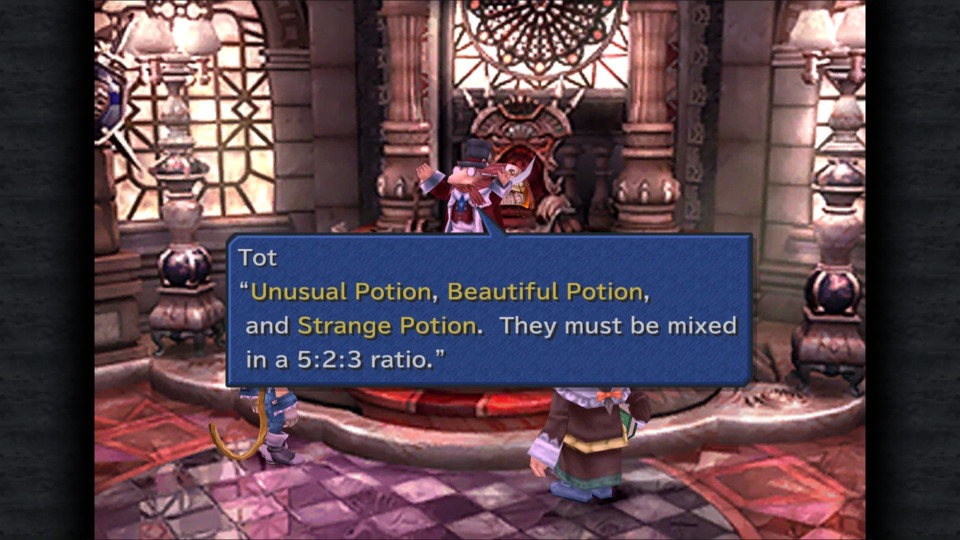
Man, this game can go fuck itself sometimes! A major issue I have with Final Fantasy IX has been the game's consistent inability to bridge the gap between its poignant story moments. Here the immediate complement to witnessing the razing of Alexandria is collecting potions to cure Cid of being a bug. Fuck that! Fuck this game! Fuck everyone who thought this was a good use of my time! We just learned Garnet is in turmoil, and this is honestly the best the writers could come up with to complement that? FUCK ME! FUCK CID, AND FUCK HIM FOR ROPING ME INTO HIS BULLSHIT!
Collecting the potions for Cid is contrite and contrived at best, and narratively harmful at its worse. This is no better than any of the terrible mini-games in Final Fantasy VII. These aren’t blessings in disguise! They are fucking blights on an otherwise fantastic game! Collecting the potions is exactly what it says on the tin. You have to aimlessly wander the streets of Lindblum hoping to interact with anyone who may be in possession of one of the three potions Cid believes will cure him of his bug form.
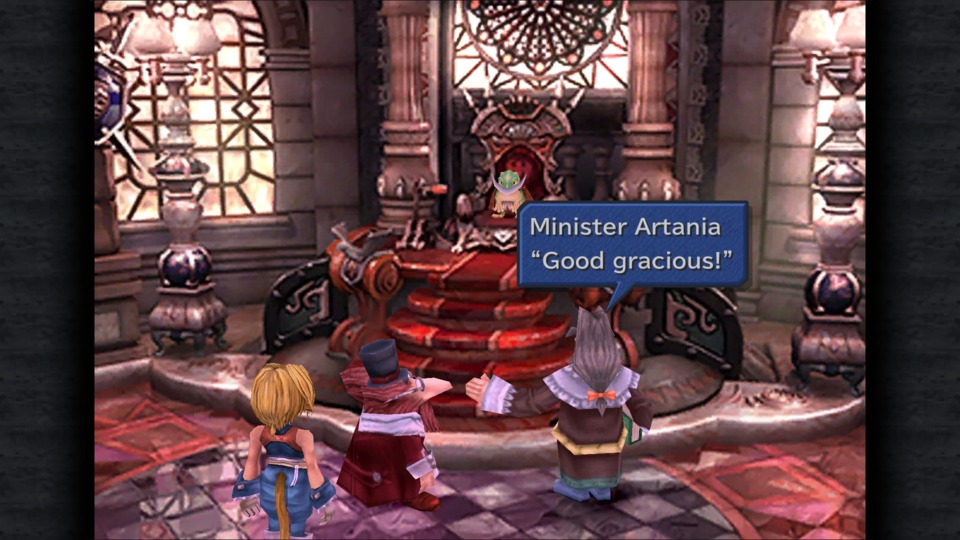
Now there’s one scene during our return to Lindblum, which I thoroughly enjoyed, I wish to praise. Here Zidane is attempting to retrieve the potions when we encounter the couple we rescued in Burmecia. Zidane interacts with the couple and they quickly welcome their army of children to him. The couple even introduces Zidane as “father’s savior,” to his drove of offspring.
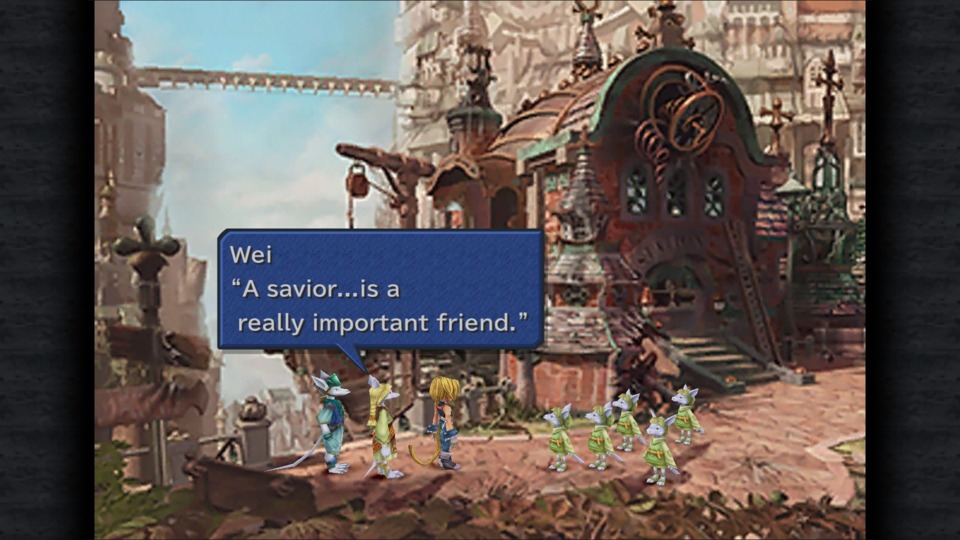
Taking the time to provide a visual reward for your actions from a previous scene is certainly a treat. I know I keep saying there’s an attention to detail in Final Fantasy IX I find respectable, but it bears repeating. On top of this scene, as you walk throughout the streets of Lindblum you begin to notice the city is recovering from the devastation wrought upon it by Queen Brahne’s army from earlier. It is not an entire rebirth, but it is a recovery built upon the hard work of every NPC in Lindblum. Time and time again we have witnessed the citizenry work on rebuilding their homes and businesses and the fact we can see progress on this rebuilding took me by surprise. In any case, after Cid has been transformed into a frog our party decides to head on over to the Black Mage Village to collect clues on Kuja’s current whereabouts.
Part 86: Hooray! The Story Goes Back To Being Interesting!
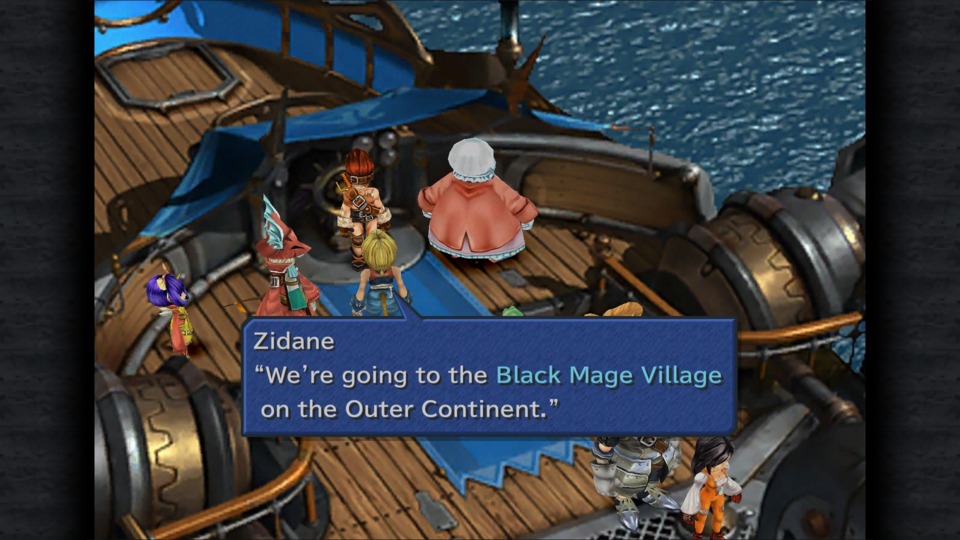
I guess I can count my blessings because the brief transitional scene we have in the Black Mage Village assuages many of my aforementioned qualms. Back is the emotional grit and brevity I have previously championed. Gone are the forced moments of comedy which shirk the game of its humanity. We enter the Black Mage Village and discover it to be abandoned of its normal villagers. All who remain are the leader, as well as the black mages who have been nurturing a Chocobo egg since our first incursion into the township.
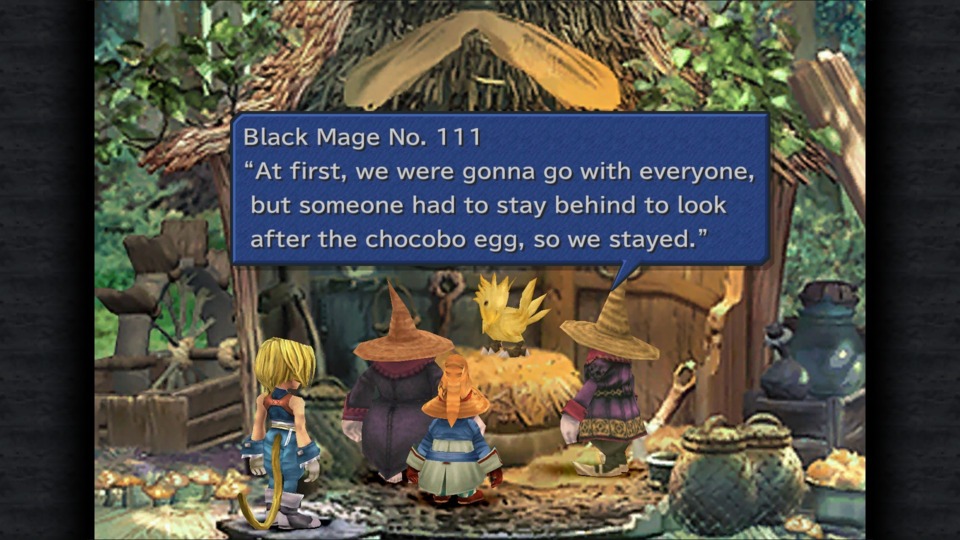
The leader has a frank and honest conversation with Vivi and Zidane. Kuja arrived at the village and revealed the mortality of the black mages to all its citizens. Per contra, Kuja promised the black mages with a cure to their mortality. Much like the victims of a cult, the villagers flocked to Kuja in droves not realizing they were being hoodwinked. As the village leader explains this you begin to place yourself into the moccasins of the villagers. You understand the reasons behind their decision making, and while you may not agree with it, you empathize with their circumstances. We have all pined for an easy fix to a complicated matter which has none, and this is exactly what the black mages are guilty of. It is worth noting the game is clear there is not a “right or wrong” answer regarding this matter. Vivi professes to being able to place himself in the shoes of his compatriots, while also wishing to stop Kuja’s nefarious plot. Final Fantasy IX avoids boiling down complicated issues into a two-sided spectrum which would otherwise belittle the scope of the morality of the issue in the first place. While most games today still fall prey of color coding, or visually indicating the good or bad of any issue, Final Fantasy IX embraces the entire spectrum and asks you to reach your own conclusions.
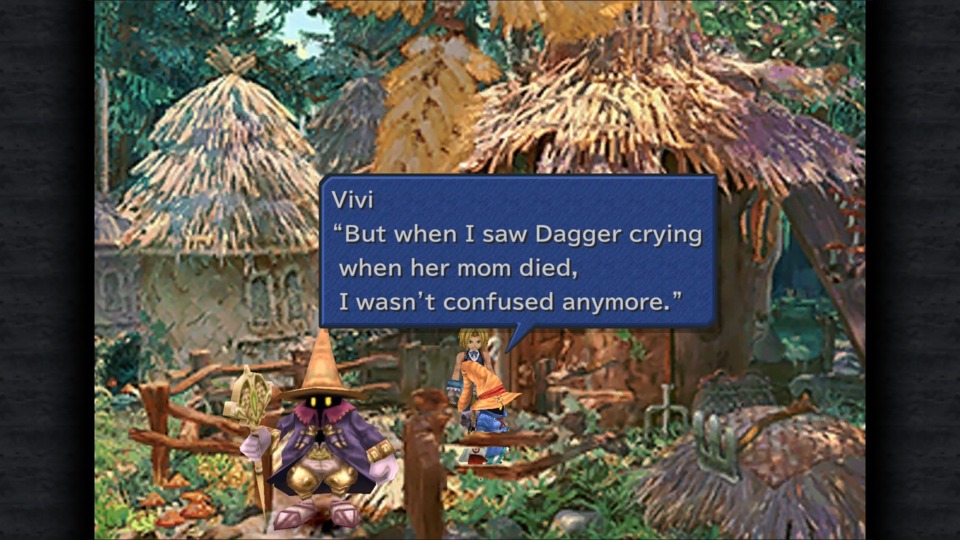
I would also like to mention how vicious the foreshadowing is regarding Kuja’s promises to the black mages. Later moments in the story will essentially hoist Kuja on his own petard, and he will be left wishing he truly did have the ability to extend one’s life. What could have simply been a scene where we learn where to find the villain, also provides a deeper purpose and this further highlights how masterful the writing can be. The developers are not just getting the most bang for their buck, but they are simultaneously weaving in multiple dimensions to their storytelling. This causes the audience to stop and think about previous moments in the game, and ask themselves if their original interpretation of its purpose was correct. Any time a game prompts me to look back, initiate my metacognition, and reflect upon my thinking is a game worthy of unequivocal praise.
Eventually, we make our way to the Chocobo stable to find the other two black mages who elected to stay behind. The baby Chocobo provides the game of its most nakedly transparent metaphor yet, but one I at least respect. From the despair which has otherwise gripped the Black Mage Village has come life, and while all which surrounds the village may be death, there still remains the potential for new life. This, in turn, serves as a fantastic foreshadowing of future developments in the Black Mage Village, as well as Vivi. Despite the trials and tribulations which beset the village there is still hope for the village and its citizens to grow and expand their culture and learning.
This metaphor provides the game with its final segue to Vivi interacting with the village leader. After struggling to answer why he stayed behind, the village leader continues to be relentless in refusing to reveal where Kuja can be found. The leader has the real fear we may inflict more harm to his fellow citizens than Kuja. As was the case prior, while we are not expected to agree with the leader we can at the least empathize with him. Vivi, who steadfastly avoids talking down to or belittling the leader, proceeds to share his life story with him. He professes he is aware his time is limited, but remains to committed to crafting the greatest amount of good out of his finite time. He remains devoted to stopping Kuja as Vivi now understands the meaning to the feelings of pain and loss. Vivi also knows Kuja wishes to inflict these harmful feelings across all the continents.
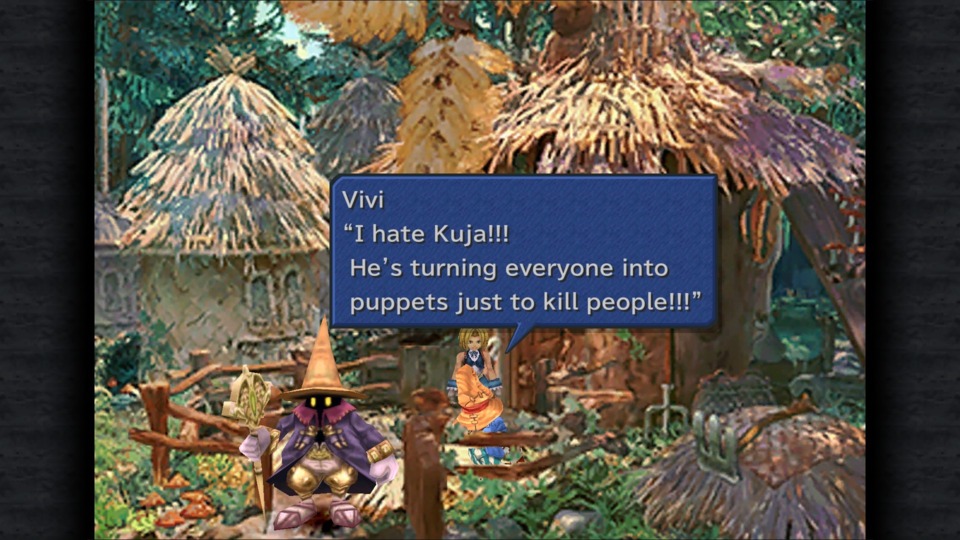
Through his journey with his friends, Vivi has learned to understand and appreciate life, while also discerning the importance of avoiding pain and death. Those who would abuse life, or even end it wantonly like Kuja, are not figures to be embraced openly. Vivi has evolved spectacularly from the naive and impressionable youth we first encountered, and he shares this with the village leader. It is this emotional plea, and not an act of violence or force, which convinces the leader to finally relent and tell us where to find Kuja. To me, this is one of the most powerful lessons which Final Fantasy IX has imparted on its audience. While appealing to people’s emotions and humanity may not be the easiest way to accomplish your task, it is the most moral and rewarding path one can take.
Part 87: I Think Someone At Square Watch David Lynch’s Dune One Too Many Times
With everyone thoroughly impressed by Vivi’s plea, we witness Garnet silently meditating over what she has just seen. She is still incapable of speaking but is not prevented from having internal monologues. During one such monologue, she indicates a greater need on her part to be stronger and more independent like Vivi. Noticing Garnet in distress, Eiko approaches her and can automatically deduce what is troubling her. While I could decry this as being oddly “convenient,” the game’s execution completely redeems it of this moniker:
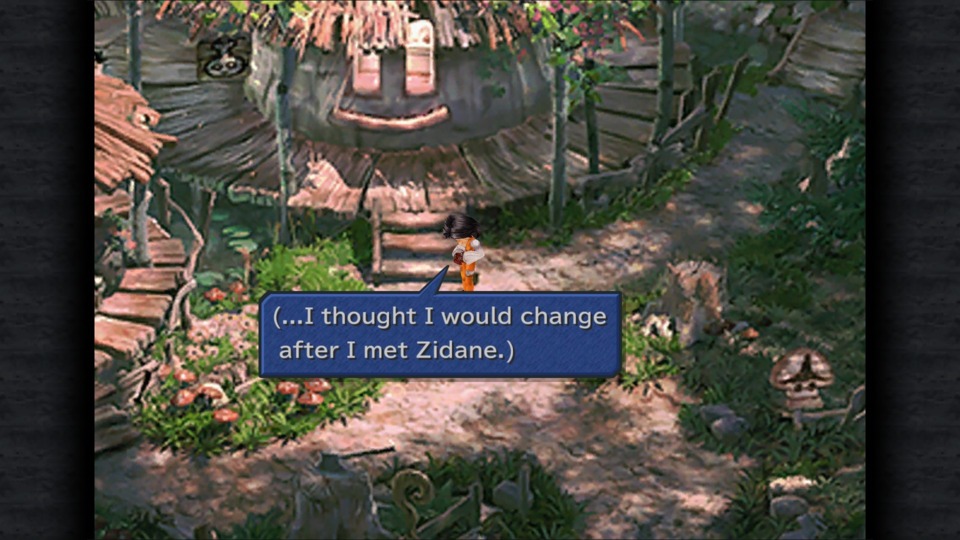
These are the “real” moments which should populate Final Fantasy IX, and not the pointless faffing about. The characters are beyond relaxing and playing around, as they did so for much of disc one and two. Now is the time for each of them to play an active role in addressing the problems and maladies which face their world as well as themselves. Not only that but the members of our party know how important each of them is in accomplishing our goal of stopping Kuja. On top of this, everyone is gaining something tangible from being on this adventure. Garnet is learning how to be a just leader; Vivi is learning the importance of cherishing every moment he has; finally, Zidane is learning he cannot handle every problem he faces alone. Each of our party members has a legitimate reason for being on this adventure beyond a general desire to stop the villain. Not only that, but the game fully executes on each of these points within its narrative, and does so in some of the most fantastic and emotionally taut scenes I have witnessed in a video game. So where do we go from here?
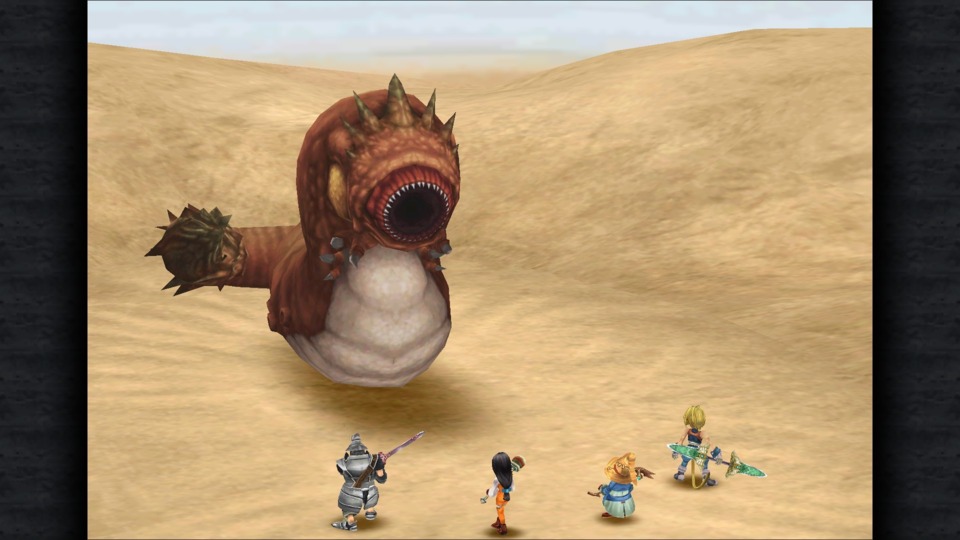
Well… at least we aren't playing Tetra Master. After following up on the hint Kuja is located in an underground palace beneath a sand pit, we immediately find our entire party ensnared in a trap set by Kuja. Maybe next time when we see a sandpit we ALL shouldn’t jump into it. I’m just going to propose this as an idea and move on. Having imprisoned our entire party, Kuja forces Zidane to hear out a proposal he wishes to share with him.
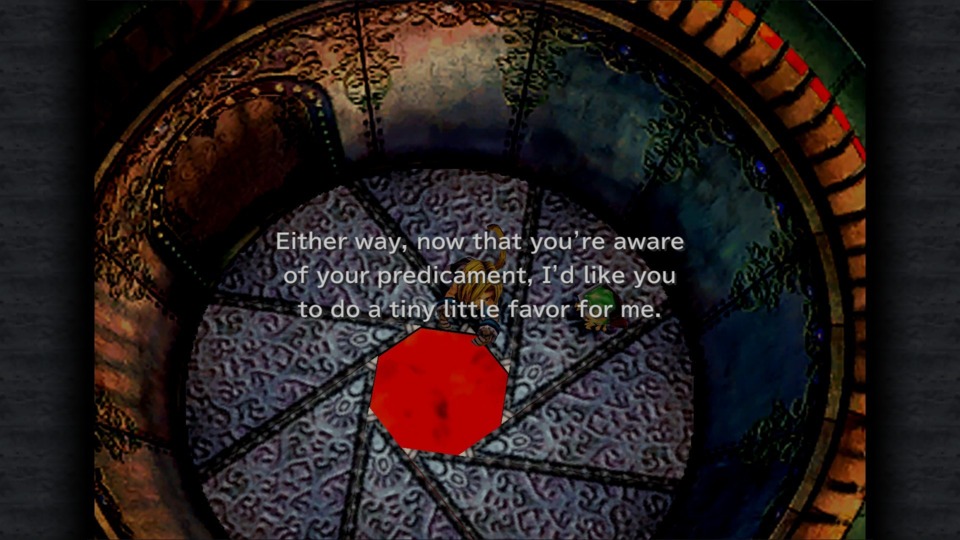
When Zidane enters Kuja’s private quarters, Kuja confides his “master plan” with him. Kuja wishes for Zidane to assemble a party to infiltrate a dungeon in the ancient city of Oeilvert. The reason Kuja has not already accomplished this is the ancient city has a special barrier which inhibits all forms of magic within it. This tenuous alliance is just that, and it is clear Kuja wishes to use the resources from within this ancient city to further his own goal of purposefully spreading more chaos across the continent. However, with our party dangling over pits of lava, we are forced to accept Kuja’s temporary truce.
Part 88: I Regret My Life Choices
Do you want to know who sped through Kuja’s explanation on the magical barrier in Oeilvert?
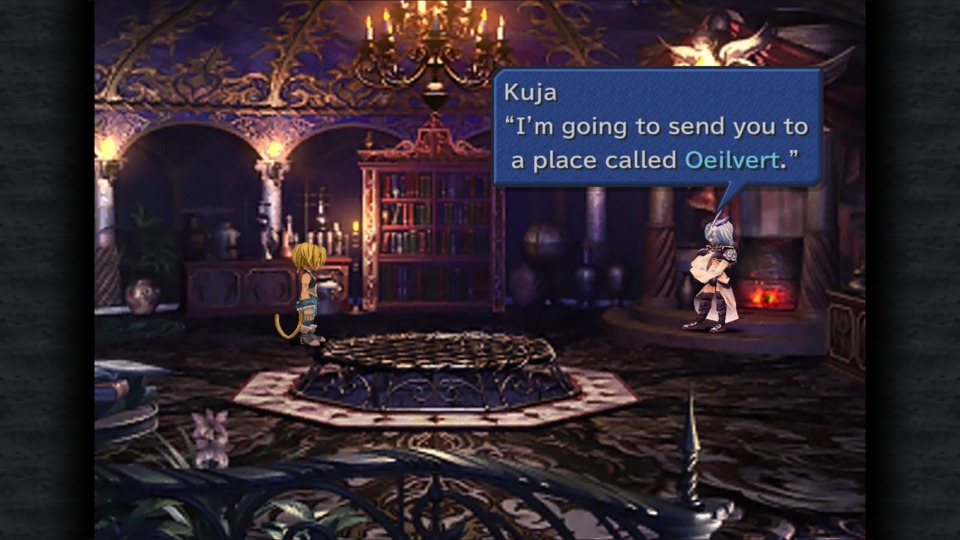
You know, the special barrier which renders all the magic based members of your party inert?
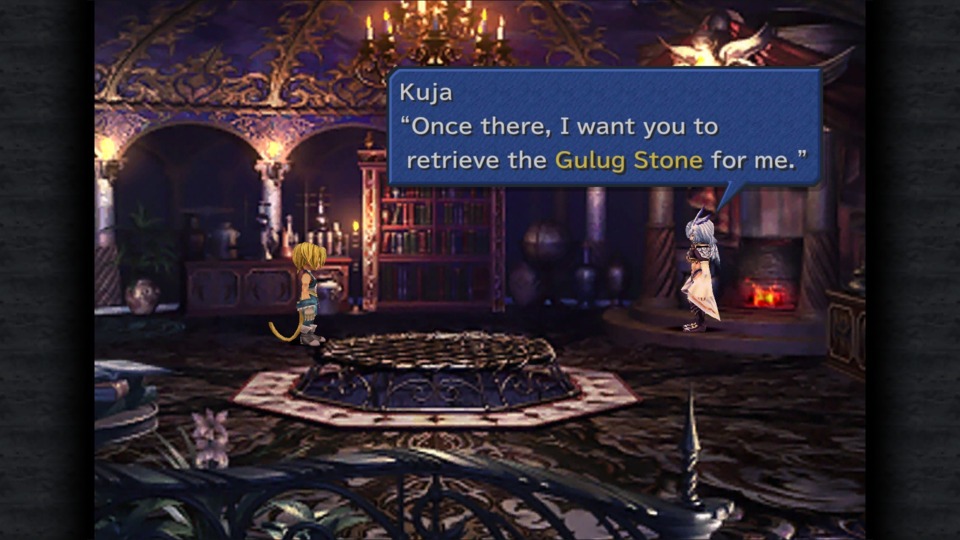
Do you want to guess what my party composition was for the dungeon in Oeilvert? Just guess…. If you need a hint think of the worst possible party to bring to Oeilvert.
